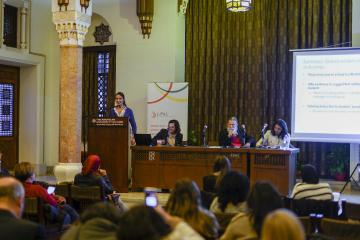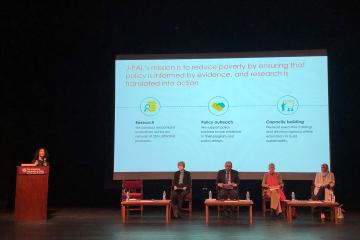
Guiding investments in long-term human capital development in Egypt: A recap from the Global Evidence for Egypt Spotlight Seminar on early childhood development

Despite substantial progress, approximately 40 percent of children under five in Egypt are at risk of not meeting their full development potential due to malnutrition, poor health, and lack of adequate access to home-based and center-based care and education. Encouraging cross-sectoral investments in early childhood development (ECD) is essential to generating long-term benefits for children, promoting socio-economic growth, and disrupting the intergenerational transmission of poverty in Egypt.
J-PAL Middle East and North Africa (J-PAL MENA) at The American University in Cairo (AUC) co-hosted a seminar (recording here) with UNICEF Egypt on May 19, 2022 to share global evidence on early childhood development to guide investments in long-term human capital development in Egypt.
This seminar was the sixth in a broader Global Evidence for Egypt Spotlight Seminar Series that aims to foster a discussion between Egyptian policymakers, development practitioners, and J-PAL affiliated professors using rigorous evidence relevant to timely policy priorities in Egypt.
The seminar featured H. E. Nevine El-Kabbag, Minister of Social Solidarity; Dr. Wael Abdel-Razek, Head of the Primary Healthcare and Nursing Sector at the Ministry of Health and Population; Dr. Karen Macours, Professor at Paris School of Economics and Co-Chair of the Health sector at J-PAL Global; Dr. Inas Hegazy, Early Childhood Development Manager at UNICEF Egypt; and Jeremy Hopkins, UNICEF Representative in Egypt; and was moderated by Alison Fahey, Executive Director of J-PAL MENA at AUC.
Dr. Macours began the discussion with a presentation on takeaways from J-PAL’s global evidence base on effective domains of investment in early childhood development.
Dr. Hegazy brought a development practitioner’s perspective into the discussion, focusing on the role of integration and efficient coordination mechanisms among key players to maximize benefits for children.
Dr. Abdel-Razek followed with an overview of the Ministry of Health and Population’s efforts to increase coverage of preventive health services among children as well as persisting challenges.
H. E. El-Kabbag then concluded the panel with a discussion of the Ministry of Social Solidarity’s approach to tackling ECD from a social protection and justice angle.
Ongoing efforts to encourage early childhood development in Egypt
The Government of Egypt perceives ECD as a fundamental right for all children and incorporates investments in ECD in its strategy to address multidimensional poverty across Egyptian governorates.
In her remarks, H. E. Minister El-Kabbag emphasized the importance of establishing new nurseries and improving the quality of existing ones to increase the number of children aged 0–4 enrolled in center-based care across Egypt from 8 percent to 60 percent. The Ministry of Social Solidarity (MoSS) is collaborating with the Ministry of Education to develop a curriculum for children that focuses on personality development, nutrition, and health to improve children’s early cognitive development. MoSS is additionally implementing programs focused on awareness raising to correct misperceptions about enrolling children in nurseries and encourage caregivers to pursue early care and education for their children.
The Ministry is also rolling out programs to educate mothers and encourage investments in children’s first 1,000 days. H. E. El-Kabbag indicated that MoSS is keen on incorporating evaluation in its programs to measure their impact on intended outcomes and children’s early development.
Similarly, Dr. Abdel-Razek illustrated that the Ministry of Health and Population (MoHP) strives towards improving coverage of healthcare services, particularly nutritional services for children. The MoHP is using digital transformation to institutionalize a comprehensive approach and ensure reaching different socioeconomic groups in Egypt to fulfill all needs of early childhood, especially at the age of vaccinations. He further elaborated that capacity building for service providers, health education, and awareness raising for parents and caregivers regarding early detection of illnesses are among the MoHP’s priorities.
Finally, Dr. Hegazy highlighted in her remarks that early childhood development requires integrated packages of interventions, explaining UNICEF Egypt’s outlook that multiple factors impact children’s early development, and that interventions should accordingly incorporate cross-sectoral elements to lead to better impacts. As such, UNICEF believes in bringing together the efforts of key ECD stakeholders and has supported the Government of Egypt in developing a national strategy and an action plan for promoting ECD.
In their dialogue, all panelists pointed to the importance of efforts to improve the availability and quality of childcare services to help children reach their full potential and facilitate sustainable development in Egypt.
Key lessons from evidence on early childhood development
Evidence from randomized evaluations suggests that interventions to encourage early childhood stimulation, promote a healthy home environment, improve nutrition, scale preventive health interventions for mothers and children, and provide cash transfers conditional on health and nutrition behaviors can have positive impacts on early childhood development and long-term human capital development. Dr. Macours shared the following key takeaways from the evidence:
i. Encouraging early childhood stimulation (ECS) from parents and caregivers can improve children’s cognitive development
Evidence from 17 evaluations conducted in 11 low- and middle-income countries, including Jamaica, Bangladesh, Columbia, and China, finds that early childhood stimulation programs targeting children aged 0–3 can lead to improvements in cognitive development, especially for children who are most disadvantaged. An evaluation in Jamaica finds that ECS impacts persist into adulthood, leading to improved long-term outcomes in schooling, employment, and earnings.
ii. Targeting nutritional practices or supplementation can have positive impacts on ECD outcomes, although the evidence is mixed
Evidence suggests that reminders and nudges can help shift feeding behavior, but more evidence is needed. In Zambia, reminders around feeding children four to five times per day and the importance of protein intake reduced stunting among children. In contrast, three health education campaigns for parents in rural China had no effect on children’s hemoglobin levels or anemia. Research in Columbia, Bangladesh, and China indicates that interventions narrowly targeting a specific micronutrient deficiency can have limited effects, as there are often multiple drivers of undernutrition.
iii. Improving coverage of preventive health services can reduce illnesses that hinder children’s development
Interventions to improve the supply and demand of preventive health can have positive impacts on early childhood development, as communicable diseases, vaccine-preventable illnesses, and poor health can hinder children’s growth into their full potential. In Kenya and Malawi, researchers found that subsidizing user fees for key preventive health products and eliminating cost-sharing when possible can help increase caregivers’ take-up and in turn have positive impacts on ECD. In India, researchers similarly found that incentives and nudges to promote health behaviors can increase caregivers’ take-up of preventive healthcare services and have positive impacts on children.
iv. Conditional cash transfers (CCTs) can cut across multiple domains to increase healthy behaviors for children in the short-run and improve their health and education outcomes in the long-run
Evidence from thirteen low- and middle-income countries, including Nigeria, Indonesia, Tanzania, Mexico, and Honduras, shows that cash transfer programs conditional on the use of health products and services generally increase uptake of targeted health behaviors and improve child health outcomes in the short term and can improve cognition and educational outcomes in the longer term. In Nicaragua, researchers found that the timings of CCTs matter, as transfers to poor rural households were more effective for boys who received transfers starting in utero relative to boys who received the transfer starting at age 2–5.
While global evidence on ECD is overall promising, evaluating ongoing programs in Egypt is essential to grounding the evidence in Egyptian context and answering questions about delivering ECD programs at scale to sustain long-term human capital development.
J-PAL MENA at AUC will continue to engage policymakers, development practitioners, and J-PAL affiliates in discussions on priority issues and development challenges in Egypt as part of its Global Evidence for Egypt Spotlight Seminar Series with UNICEF Egypt. Register for email updates and follow J-PAL MENA’s accounts on Twitter, Facebook, and LinkedIn to find out about future events and seminars.
Related Content

Strengthening the Egyptian education system: A recap from the Global Evidence for Egypt spotlight seminar on education

Toward an evidence-informed development agenda for Egypt: Fostering government-research partnerships



